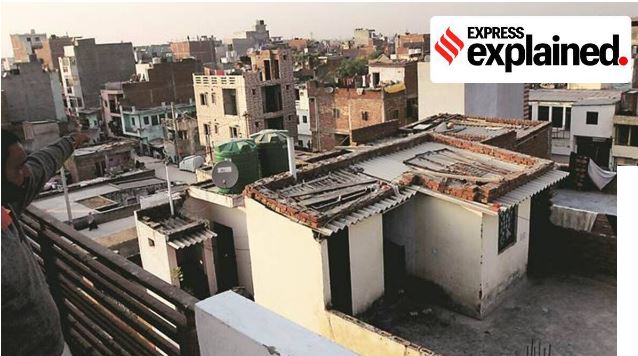Explained: Why is the Punjab government silent on already-registered sale deeds in illegal colonies?
We take a look at the one-time settlement policy brought in to regularise illegal colonies in Punjab, and the questions raised over the illegal sale deeds of plots/buildings in such colonies
Recently the Punjab government issued new instructions on registration of sale deeds of plots/buildings in the illegal/unauthorised colonies, but it is silent on the issues of already-registered sale deeds of plots/buildings in such colonies and illegal regularised colonies.
As per instructions, a ‘No Objection Certificate’ (NOC) from competent authorities is required which is issued after plot/building holder deposits mandatory development charges. Law says that all such plots/buildings, which were registered without NOC in regularised/illegal colonies in the past, are illegal and such plot holders are not eligible for the basic amenities.
The government brought several one-time settlement (OTS) policies in the past to bring the illegal colonies, & plots/buildings under the legal framework of the Punjab Apartment and Property Regulation Act (PAPRA), 1995, (amended in 2014) to provide the basic amenities to the people in such unplanned colonies. And the latest policy in this list as of April 20, 2018, regularisation policy which came following the enactment of Punjab Laws (Special Provisions) for Regularisation of Unauthorised Colonies Act, 2018, (Punjab Act 10 of 2018), which was brought on April 19, 2018. This policy was to regularise both illegal colonies and plots/buildings in these colonies which were carved out before March 19, 2018.
For regularisation, both colonisers and plot holders were required to pay the composition fee and development charge, respectively, as fixed by the government so that such funds could be used for providing basic amenities and maintenance, among others, by the government bodies. This policy made a pre-requisite that the plot/building in the illegal colonies could be regularised only after the regularisation of the colony.
Then why the plots in these illegal/unauthorised colonies were regularised even when the colonies are still unauthorised?
On October 12, 2018, the same policy was amended and re-introduced under pressure from colonisers in which plots and colonies were made independent of each other and the plot holders of such illegal colonies were allowed to get their plots regularised by depositing development charges and obtaining NOC even if the colony was still unauthorised. As several colonisers did not deposit the mandatory fees for regularisation, lakhs of plot holders in thousands of illegal colonies started getting registered sale deeds.
When the 2018 policy made NOC and development charges mandatory for the regularisation of plots/buildings, then how did sale deeds take place without NOC & mandatory charges in such colonies?
Advocate Mukesh Verma of Punjab and Haryana High Court said that unlike previous such policies, 2018 was not a time-bound policy despite having all ingredients to stop the illegal sale deeds because of which government officials of revenue, urban housing and local bodies departments in connivance with the colonisers got issued different instructions from the previous government including the one in which the government said that no NOC is needed for property registration, which was a clear-cut violation of government’s policy.
“When the condition of NOC was not there, people of not only colonies carved out before March 19, 2018, deadline got sale deeds done but also thousands of others came from those colonies which were carved out after this deadline and the government has no formal record of that,” he said, adding that colonies carved out after the deadline do not come under any law/policy of the state.
He also pointed that when the government is issuing instructions regarding the sale deeds in the illegal colonies, it should also mention about “illegal regularised colonies” because illegal regularised colonies are those which have been regularised under regularisation policy of 2018 or before that and as per the policy every plot/building in such illegal regularised colonies must be regularised after paying development charges, and getting NOC before registration of the sale deed.
In Punjab, a large number of plot holders in illegal regularised colonies are yet to regularise their plots/ building, said a senior officer in the revenue department.
All Punjab urban housing, local bodies and revenue officials are aware of it as they have blatantly flouted 2018 policy, PAPRA and Registration Acts, he said, adding that government is not talking about the sale deeds already done without NOCs.
What are the consequences and solutions to such illegal sale deeds of plots/buildings in such colonies?
As per the 2018 policy, the consequences for non-submission of application for regularisation of unauthorised plots/buildings mean that no connection between the water supply and other sources like sewerage, drainage, electricity, etc. No building plan shall be approved by the building plan sanctioning authority on such unauthorised plots. No sale deeds of the plots or buildings falling in unauthorised colonies shall be executed without getting a regularisation certificate – valid provision and regulation certificate.
Even demolition may be initiated. But the government will not do so under the pressure of the people. “Either government pay for providing basic amenities by bringing some new policy for such illegal plot holders or government may ask them to pay the development charges if they want basic amenities,” said a senior officer in the revenue department, adding that currently, the government is silent on it.
Punjab revenue department minister Brahm Shanker Sharma Jimpa admitted that these sale deeds without NOCs are illegal and said that they will look for a solution to it.
What were the previous OTS policies and how many colonies and plots were regularised under those policies?
The Punjab government had earlier enacted the Punjab Laws (Special Provisions) Act, 2013, which was further re-enacted in 2014 and again in 2016 for the framing of policies. Out of these three enactments, the first two remained operative for one year each i.e. from April 17, 2013, to April 16, 2014, and February 6, 2015, to February 5, 2016, respectively. The third enactment remained operative for six months i.e. from October 21, 2016, to April 20, 2017.
As per these policies, while 6,662 applications were received for the regularisation of unauthorised colonies out of which 3,377 fall within municipal limits and the remaining 3,285 colonies are outside MC limits, 2,565 of these colonies have been approved. Besides this, 3,80,912 plot/building owners had applied for regularisation of their plots/ buildings to the different local bodies and special development authorities. Out of these plots 3,33,6340, plots/buildings have been regularised by different competent authorities.
Experts said that one can imagine the mushrooming of illegal buildings in the state from the number of illegal plots that came for regularisation under these OTS schemes and they have now increased significantly in the past five years.


